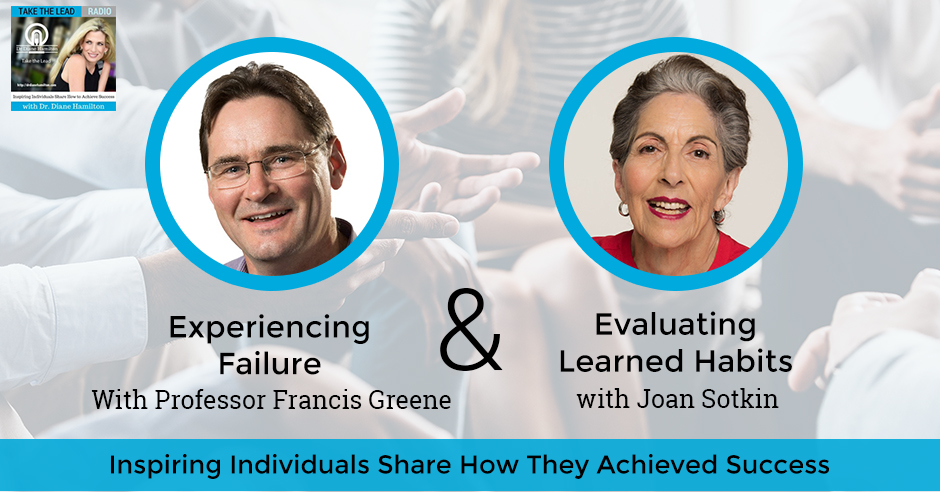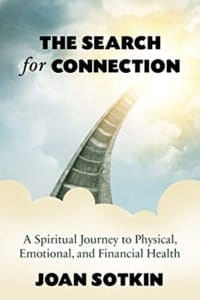
I’m glad you joined us because we have Francis Greene and Joan Sotkin here. Both Francis and Joan deal with entrepreneurs, mindset and how to be successful. We’re going to talk about a lot of very interesting things about entrepreneurship.
Watch the episode here
Listen to the podcast here
Experiencing Failure With Professor Francis Greene
Professor Francis Greene is the Chair of Entrepreneurship and the Head of Entrepreneurship and Innovation Group at Edinburgh’s University Business School. He is the Director of Scottish Scale-up Consortium whose aim is to develop and deliver a Scottish scale-up education program for Scottish scale-ups. He’s got a new textbook coming out, Entrepreneurship Theory and Practice. I’m excited to talk to you, Professor. Welcome.
Thank you very much, Diane. It’s a pleasure to be here.
It’s going to be fun because you talk and write about a lot of things that I’m interested in. You caught my attention on an article you wrote in the Wall Street Journal, which I talk about so many things that you wrote about in my courses. I thought, “I need to talk to this professor. He has an interesting perspective about failing fast, if it’s good, if it’s bad, and what it is.” We talk about that a lot when I work with organizations. We talk about how past mistakes impact what we’ve learned and what we do going forward. You have a unique perspective on that. Before we get to that, I want to get a little background on you, how you got to the point of writing heavy-duty textbooks like this and getting printed your work in the Wall Street Journal.
I’m an entrepreneurship specialist. I’ve worked at the university here in Edinburgh, but I also worked at other universities in the UK. I’ve also done a lot of consultations with entrepreneurs, worked with entrepreneurs over the 25 years that I’ve been working at universities. I’ve worked also for organizations like the OECD, Organization for Economic Cooperation and Development and the European Commission. I’ve worked not only in Europe but also in Australasia. I advised, for example, the New Zealand government on their scale-up activities, which is high growth activities. I’ve done a bunch of stuff all in the entrepreneurship space.
You have and you’re definitely an expert in that field. When you write about certain things, it catches people’s attention. What caught my attention is we hear that a lot of the readers will say they failed, but the best lessons they learned from failure have made them what they are now. We hear that sometimes it’s a good thing to fail. In your research, you found maybe not. Do entrepreneurs learn from their mistakes or not?
Like you, I’m interested in what entrepreneurs have to say about those experiences. I’ve talked to a bunch of people about those experiences over the course of my career. One of the interesting things is how people treat failure. For some people, it is the case that they do learn from failure. There’s no doubt about that. Some people do learn from that. What I was interested in is that those individual experiences of learning from failure, how does that translate into the general population of entrepreneurs? We might look at individual examples of success, but how is that replicated throughout the whole wider population of entrepreneurs? The reason why that’s interesting is because there is this myth that if you have failed, the next time around, you’re more likely to be successful.

I was intrigued to find out what was going on. What I did is I talked to a lot of entrepreneurs to get their experiences. I also got large scale data on approximately 8,000 entrepreneurs. What I was interested to look at was, if you’d failed before, what impact that had on your subsequent outcomes when you set up a new business. What I found was that if you failed before, the chances are, on average, you are more likely to fail again. It didn’t necessarily lead to success. That’s quite an intriguing puzzle, I thought. The difficulty is to explain that in robust terms so that people can understand why an individual may profit from failure. In general, it doesn’t seem to be the case that entrepreneurs set up more successful businesses if they’ve failed.
Did you look at German startups for that study?
Yeah. Germany has some of the best data in the world on entrepreneurship. It’s like their cars, they have good data.
Can you extrapolate that to other countries though? Do you think that Germany is any different than the UK, than US entrepreneurship?
Not particularly, I would say. We looked at the institutional conditions or what are the differences between the side of the United States or the UK or Germany. There are differences, but they’re marginal differences. We don’t have any big data at this particular point in time on failure experiences in the US. I’m not sure that people differ that much in a country such as Germany, which is the biggest economy in Europe, compared to say the United States. There may be differences, but I’m not sure what that big difference is.
That’s interesting that there’s not more US research. You talked about in the US, only about half the startups make it to their fifth birthday though.
When you start looking at the statistics, it’s quite a grim picture. What you find is that very few businesses make it to adolescence. A lot of businesses don’t make it in childhood under ten years. Adolescence is in trouble and so not many businesses make it into their twenties. That doesn’t mean to say they all failed. That’s not what I’m saying. Essentially, as it is that business, it looks as if it’s exited, which is not the same as failure. Failure is a different category altogether. What we mean by failure is that you’ve got liabilities that exceed your assets in some respects, so you can’t pay your way. That’s what we typically mean by failure. You’re going bankrupt or you’re going insolvent. The businesses that exit are not all failures in that respect.
[bctt tweet=”There’s a myth that says if you failed, the next time, you’re more likely to be successful. ” via=”no”]When you’re talking about failures, you bring up what we’ve learned from our mistakes, but can we take the mistakes from one company and if you solve that problem, it’s going to work in the next company, or is it every situation is so unique that you can’t do that?
It’s very difficult. This is part of the explanation of why it is difficult to translate a failure experience into a successful experience in a new venture situation. One of the issues is that no two businesses are the same. The customer is likely to change. The market is fickle. Circumstances change in the external environment, team composition, etc. It’s very difficult to say that there are the same grown rules in place. One of the analogies that I used for this is if you’re playing a sports game or you’re playing something like chess, all the pieces on a chessboard are fixed. You know how many there are. You’ve got sixteen. Your opponent got sixteen. There are 64 squares and the pieces move in a particular way. You still get quite a lot of randomness and a difference between a game to game. In a business situation, the board isn’t the same, the pieces aren’t the same. It’s very difficult to extrapolate learning from failure in those sorts of fairly turbulent contexts.
It’s interesting how much tenacity plays a part in whether these entrepreneurs make it, what they’ve tried to figure out about their customers. When I studied the perception of how everybody looks at everything, of what they’ve learned from a situation, you were talking about maybe they don’t understand their customer preferences. There’s so much to take into account what causes this failure. If you necessarily solve the problem that they had the first time, it doesn’t necessarily work the next time. One thing that you wrote I thought was interesting. You said as far as what happens to these companies, a lot of them don’t close quickly, that they limp along. I had a boss who said something to me once that reminded me of that because I said, “How does this company stay alive when it’s so poorly run?” He said, “It’s a lot harder to kill a company than it is to create one.” Do you agree with that?
I agree with that. There’s a common psychological bias where we tend to suffer, which is called sunk cost bias. Once we’ve invested in an activity, it’s very difficult, especially if we’ve put a lot into it to give up on that activity. That’s worse or more painful for us if it’s something that’s associated with a psyche or a social standing. Therefore, it’s easier to limp along on a psychological basis rather than be rational about it and say, “This business isn’t working at all. I need to close it and look at another opportunity.” What you’re alluding to, which I also think is important is that tenacity, perseverance, passion are all important entrepreneurial virtues and they are virtues. There comes a point when passion becomes an obsession when tenacity and perseverance look like folly. It can be difficult for people to recognize the good virtuous bits of being tenacious and when they’re acting in a situation where they should perhaps reflect on their chances of success.
That requires a lot of soul searching and curiosity, asking yourself questions. I know a lot of entrepreneurs would be considered curious, but sometimes people get tunnel vision. They’re very curious in one specific way. How important do you think curiosity is to the success of an entrepreneur? How do you know if you’ve got tunnel vision because you’re super curious about creating the next Tesla? Maybe that’s not enough.
I wouldn’t say I particularly have enough evidence to talk about how curious entrepreneurs are. It’s an important issue. It’s the same with tunnel vision. It’s quite hard to work out when that’s good and when it’s bad. It’s important, but that’s my own opinion from having dealt with a lot of entrepreneurs.

You write a lot about entrepreneurship. What’s interesting is in my research on curiosity, I found that there were four things that kept people from being curious. They were fear, assumptions or the voice in your head, technology and environment. Fear is a huge inhibitor in so many things that entrepreneurs deal with. In your book, Entrepreneurship Theory and Practice, you’re probably dealing with so many aspects of entrepreneurship, but I’m wondering do you deal at all with fear of rejection or failure in that book? What other misconceptions do we have about entrepreneurs that you might’ve touched on there as well?
One of the key things that I’m interested in is the notion of reflectivity and entrepreneurship. One of the things I talked about in the Wall Street Journal piece is about the notion of pre-mortems were one way of avoiding falling into competency traps. You think you’re doing well, but you’re repeating the same old ways of doing things is to step back and reflect on what are the actual chances of this particular venture being successful or not. I’m quite keen on that reflectivity. I’m also quite keen on people being reflective in terms of how they plan their own business. One of the things that I advocate in my latest book is essential if you’re setting up a business, the bank will tell you or some other people are telling you, “Write a business plan.” To me, if you’re doing that as your first activity, it’s misguided. That’s a completely misguided way of approaching, planning for your business.
What should be first?
It’s getting out there, talking to customers, finding out about your market, understanding your product, doing all those soft qualitative aspects before you write anything down. Why is that important? You don’t know who your customer is, for example. You don’t know who your supplier is. You don’t know if anybody wants this. Before you get fixed on an idea, it’s good to have that level of flexibility. Don’t write a plan first. That’s one of the key things. That doesn’t mean to say that at some point you shouldn’t write a plan. A lot of research that I’ve done has looked at the role of planning and found that writing a business plan, as long as it’s done at the right time is a very useful activity. It allows you to reflect on the operations, the logistics, the finances, the sales, the marketing, all of these normal things that any startup needs to face. It allows you to reflect on those. That is useful, but don’t do it from the get-go.
You said talk to people and find out what they want, but you also mentioned in your article that Steve Jobs famously said, “A lot of times people don’t know what they want until you show it to them.” Do you agree with him on that? What if that’s the case, how do you know what kind of product to deliver?
There is no one single way of looking at this. For some people, you’re going to find an opportunity. It’s going to be like a eureka moment and away you go forward. What Steve Jobs is alluding to is that you co-create or co-produce. That’s the vogue with your customers. What he’s saying is that that won’t necessarily work. What he’s suggesting, which I agree with too, for some entrepreneurs is that you’ve got to have the vision, the passion, the tenacity to back your own vision. There are different communities in all of those that can make for profitable entrepreneurial or socially conscious entrepreneurial opportunities.
Did you see Elon Musk saying he didn’t go to his customers to get feedback so much for his truck that was so unusually shaped and different things? Do you think that we’re seeing some of these bigger visionaries relying more on their own imagination?
[bctt tweet=”Failure is hard to translate into a new venture experience because no two businesses are the same. ” via=”no”]There are those people like Elon Musk, Steve Jobs who’ve got their own vision and they want to create their own worlds and they are visionary. What they’re doing are radical innovations. Most entrepreneurs are not doing that. They’re doing incremental innovations. They’re changing processes. They’re changing products somewhat or marginally or serving a new customer. That’s the vast majority of people. You can make a lot of money by being an incremental entrepreneur in the sense that you’re changing things. If that’s your area, it’s quite important to be customer-focused. If you’re divorced from your customer in that space, you’re not going to meet their needs and they’re not going to want to buy your particular product or services.
You had touched on the competency trap. I want to go back to that because as you’re bringing up all this, it brings up status quo thinking. You talked about repeating the same old ways and not everybody is a Steve Jobs or Elon Musk. For those who are falling into these competency traps, and I’m sure you probably have case studies in your book or examples of companies where this is a problem, do you have any good stories of companies other than the Blockbusters and the codex that we hear all the time of companies who went with status quo thinking and it led to their failure?
I know about Blockbuster and a lot of businesses like a Blockbuster win because they got stuck in a rut. They assumed what was successful in the past is likely to be successful again to carry on. That doesn’t mean to say that you can’t get your way out of it. One of the classics is Coca-Cola. Coca-Cola invented New Coke and proved it’s a disaster. They still had enough agility to say, “We’ll have enough humility to say we made a mistake.” I would believe that’d be fairly uncommon.
I’ve remembered the New Coke thing. I was in college when that came out. It was a huge thing. Everybody freaked out. There was no Twitter or anything at that time of people making comments and even imagine what that would do in this market. There’s so much input from social media that is it hard for an entrepreneur to avoid looking too much at criticism?
That’s an important point. That goes back to your point about how you perceive yourself and whether you’re resilient to situations. It can be very difficult for entrepreneurs to escape from some of the criticism they face in social media. At the same time, often what is important is your social network, your family and your friends. One of the things that can help with resilience is how strong your social network is amongst your family, your friends in supporting you.
Support can be important and sometimes there’s a false sense of support. I was thinking of Theranos or some of the startups that maybe faked it until they made it, but never made it because they’re faking it maybe too much. Do you see a lot of that with entrepreneurs that they feel like they have to fake it until they make it?

People are telling stories often. In order for you to get money from a VC or from a business Angel, it’s fairly clear that you need to have a plausible narrative that is cogent, has a real call to action and meets a real need for the customer. Having a strong narrative here is quite key.
There are so many ways to get financing now. How popular is crowdfunding or Angel investing? What kind of things do you write about in your book about that?
One of the myths that surrounds entrepreneurial finances is that in general, people think that venture capital funding or business Angel funding is easily available. When you look at it, there are very few businesses in the United States who get business Angel or venture capital funding. It’s tiny proportions of businesses. Crowdfunding itself, that does support like venture capital or business Angel. It does support entrepreneurs. That’s a small segment of the entrepreneurial finance marketplace. Much more important is the bank. Even more important usually is whether you’ve got a credit card or not. When you’re trying to set up a business as you know, Diane, not you using your own personal finances and have access to a credit card is often key. One of the things I would say here is that crowdfunding is important. Venture capital funding is important, but we mustn’t lose sight of the fact that the vast majority of new startups don’t go anywhere near those sources of finance.
It’s a fascinating look at the different types of companies that are started every year and how they fund them and all the myths and things that we think we know about entrepreneurship. What you write about and what you speak about is important for anybody thinking of starting their own business or branching out at all to recognize. I love the thought of the competency trap. I liked that because that’s such a catchy way of looking at it. My whole focus with my research is to get people out of status quo thinking and repeating the same old ways is what’s going to kill a lot of companies. This ties greatly into what I’m saying. I was looking forward to having you here. This has been fascinating, Professor. How can people reach you if they want to find out more about your work?
They can easily do that by sending me an email at my university. I don’t work for the Secret Service, so it’s quite easy to find my name on the internet. My name is Francis. Most people think that’s a girl’s name, but I’m a man.
[bctt tweet=”Fear is a huge inhibitor in so many things that entrepreneurs deal with. ” via=”no”]How would they get your book?
That’s easy enough. If they want to get the book, if they send me an email, I’ll link them to the publisher’s website.
Will it be available on Amazon?
Yes.
Thank you so much for joining me. This was fascinating. I thoroughly enjoyed it.
It’s been fascinating to talk to you, Diane. Thank you very much.
You’re welcome.
Evaluating Learned Habits With Joan Sotkin

I am here with Joan Sotkin, who for over 25 years has helped entrepreneurs and practitioners use their inner resources and practical techniques to experience freedom from personal, professional and financial struggles. She has a book that builds your money muscles, nine simple exercises for improving your relationship with money. She does a lot of programs and courses. I’m interested in her latest book, The Search for Connection: A Spiritual Journey to Physical, Emotional, and Financial Health, which describes her years’ long journey after giving away everything she owned. I got to hear about that. It’s so nice to have you here, Joan.
It’s great to be here.
We’ve talked before I was on your show and so I know you pretty well, I feel, at this point, which is unusual because a lot of the guests I get to know on the air. You have done a lot of interesting things. Before we talk about what made you give everything away, give me a little background because I got to the end of the story. Can you give us the backstory on you?
I’ve been around for a long time. I came from a family where my father was kind of nuts. We had a very unusual way to look at life because I was born so early. When I graduated from college in 1962, women weren’t given a whole lot of things to do except get married and have children. My father wanted me to get a teaching degree so I’d always have something to fall back on. I didn’t do that. I went away to college as a scientist to learn how to be a research chemist. I saw how much life can change. I got married twice. I knew that wasn’t my idea of a good time. I taught school for a year. I had nightmares that I had to do that again and try to find myself.
I see that now so many people, no matter what they’ve been doing, are also trying to find themselves. I didn’t have a whole lot of choices. I gave away everything I owned in the 1970s because life didn’t make that much sense to me and I had this inner urge to do this. I had no money. I didn’t know where I was going to get more money. I had started meditating in 1972. I had already become interested in our inner world. I had been into metaphysics since the early 1960s. I knew that there was something beyond that, which I was learning. When I wound up giving everything away, I didn’t have a plan. I didn’t know why I was doing it. I didn’t see that I had many choices. It turned out to be one of the best things I’ve ever done.
Some people have a lot to give away and other people not as much to give away. Did you have a serious number of things that were a financial value to you that you gave up or were you at a good time where you hadn’t accumulated that much?
I had been sick. I’m physically ill for a long time. One of the reasons I left the second marriage because it was so difficult for me. I had developed a whole lot of physical problems, which I now realize was related to all the emotional stuff. I was living in Venice Beach. I didn’t have enough money for the next month’s rent. I had tickets to go back to New Jersey to a relative’s wedding. I didn’t know what else to do. I gave everything away. I had a giveaway day. I put up a sign at one of the local stores and people came and took my stuff. There was not a lot of stuff.
My sister lives in Venice. You get vendors on the street selling belts and stuff. That’s what she did in her hippie days. That’s a hippie town, Venice?
As part of the journey, I started selling crystals and stones on the boardwalk. I rented a shelf in front of someone’s store and started my business, which became an enormous business. I started that on the Venice boardwalk.
A lot of the business people probably aren’t super into crystals and different things, but they know that they hear meditation is important or self-awareness is important. You talk about looking for internal factors that affect our decision-making. What internal factors do you think people need to look for?
At one point, this was in the 1970s, I looked around and I had two brothers who were millionaires. I couldn’t rub two pennies together. I said, “Why?” We were brought up in the same house, which was somewhat money-oriented. My father was a compulsive debtor so there was all this money talk around all the time. I asked the question, “Why?” What is it that allows one person to make millions of dollars and another one doesn’t? That became a long-term question. What I’ve come to understand is that it is the decisions we make that lead to our outcomes and behind our money decisions, our thoughts, beliefs and emotions. I see our emotions as the creative force behind our life stories.
I came from a home where emotions were never talked about. As a matter of fact, one of my father’s rules for Sotkins, since we were the only ones he had all these rules, was Sotkins don’t feel. When I went to Co-Dependents Anonymous, they used to clap when I told them how I felt. I said, “I better learn more about feelings.” One day I made this list of 60, 70 different feelings. I would practice them on a regular basis so I could put words to the things that I felt.

When I built this big crystal business, I was making a lot of money. I wound up going bankrupt because I didn’t know how to manage cashflow. I went to Debtors Anonymous. I had to figure out what was going on. I learned that the emotions that we learned early in childhood are habits that we use to form our decisions. If you want to change the outcomes of your life, including your money, you have to understand the thoughts, beliefs and emotions that are behind those decisions.
You brought up a lot of interesting things. Not feeling is interesting. They didn’t want you to feel negative emotions in your family or both positive and negative?
I remember clearly when I got that rule, my mother was in the hospital on the verge of death, although she made it through. I was talking to my father and my voice started cracking. My father said, “You know Sotkins don’t feel.” I was always the identified patient. I was the one who cried for the family. I would cry and they would say, “Stop crying, young lady.”
Did they laugh and have positive emotions though?
That was the odd thing. My brother wound up being a successful comedy writer and producer in Hollywood. Everybody told jokes. To this day, he says, “I have no idea how to express emotions. All I can do is tell jokes. I was the one in the family who was the straight man.” It was like being brought up in the house with Don Rickles. I have a great sense of humor, but it was pretty painful growing up because I was the one who always got teased and demeaned. They were always picking on me.
Were you the youngest?
[bctt tweet=”Life is a matter of re-perceiving where you are and creating another story. ” via=”no”]No, I was the oldest, but I was the girl in a very male-dominated family. At the dinner table, it was like, “Could we make mommy laugh so hard she’d pee in her pants?” That would happen.
You did have emotion. You had more positive emotions though that you guys were allowed to experience?
The laughter that came from teasing, for them it looked like happiness, but for me, it was like, “Leave me alone.” It was a normally dysfunctional family. My father came from a difficult background and my mother had her issues. We’re all a little screwed up because we didn’t come out with a manual. Even the manual that my mother bought, the Dr. Spock manual, was wrong about the things he told her to do. Everybody’s got a story. Everybody has something in their life. My parents were very well-meaning. They were very responsible parents, but they had no idea how to bring up this bright young girl who started talking when she was about seven months old. They didn’t know what to do with me. They did their best. With the work that I do now is helping people understand how their early childhood experiences are affecting the decisions they’re making. I don’t think you can run away from it. You have to look at what are the habitual thoughts, beliefs, and emotions that I’m bringing to my life that I learned in early childhood. Once you understand they are just habits, you can say, “What’s the habit and how can I change it?”
This is so important because I deal with so many people trying to be entrepreneurs and you mentioned how you didn’t have a great sense of cashflow and different things. Some of these things we learned from our experiences with our family of how they’ve taught us and what they have or haven’t taught us. You talk about five main feelings that people act out through money. I’m curious about what those five feelings are.
I had to figure out why people do what they do with their money. What I stress now is there’s nothing wrong with you that needs fixing. You have these habits. The five main feeling habits that I learned in early childhood that people act out through their money are shame, aloneness, anger, deprivation, and a sense of being trapped. I like to help people recognize how they’re having those emotions when they’re dealing with their money. That gives them an entry into healing themselves emotionally.
Anytime you understand why we have a certain feeling or emotion or something, it’s helpful. You deal with all these things, but you’re talking about overcoming a lot of financial fears, which is tied into my research in curiosity because fear holds people back from asking questions, from doing a lot of things. How are you helping people overcome financial fear?

First of all, you have to understand it’s never about money. If you’re afraid of not having enough money or running out of money, what are you afraid of? You’re afraid of having no resources, which bottom line is afraid of dying, afraid of being alone. When people look at their bank balance and they go, “I should have more. Someone my age should be making more money and what am I going to do?” that’s about shame. The problem is if you don’t deal with the emotions, you’re going to keep repeating your financial patterns, which are the result of your decisions that come from these habits. Once you recognize that when you’re afraid, it’s never about the money. What you can ask yourself is, “What is this about?” to realize that it’s a habit.
You can’t get rid of a habit. You have to replace it with something else. When I used to worry about money and I worried about money a lot, I would say to myself, “A large sum of money from an unexpected source.” What I was doing was interrupting that neural pathway where the brain was responding in a habitual way and I was imagining a much better future. As soon as I would see a large sum of money from an unexpected source, my mind would go to, “Where can it come from?” As soon as I came up with an answer, it was like, “That’s not unexpected.” It could go on forever. It allowed me to say to myself, “What if I wasn’t afraid? What if I was imagining that what I need will come to me?”
One of those things I learned when I gave everything I owned away because I did survive that and I never knew where my money was going to come from, it showed up. If I didn’t have enough money for food, I figured I was learning how to fast. It’s a matter of re-perceiving where you are and creating another story. If you’re afraid of the future, that’s what financial fear is all about. You’re afraid of running out of money, losing everything you have, someone’s going to come and bother you. You’re afraid of something, a story that you’ve made up. The future that you’re imagining isn’t true. It’s your imagination. Why not imagine anything else? What we’ve come to realize in this day and age is that thoughts are things where you imagine to be true is true.
What I see is that we create our life stories in order to act out unexpressed emotion. When you realize what you’re afraid of, which has nothing to do with money, so you’d get the money out of the statement, you can say, “What is this habit that I learned that I’m acting out through my money?” Instead of creating a situation because we do create our life stories with our decisions and these emotions are what determine what we’re going to create. In other words, if you have a disappointment habit, very common is a function of dopamine, but we don’t have to go into that. You have a disappointment habit, you’re more apt to create a story and make a decision that leads to disappointment because that’s your habit. Once you realize it’s a habit, you can say, “What would I rather be feeling?” You can teach yourself to have a different response to familiar stimuli.
[bctt tweet=”Our emotions are the creative force behind our life stories. ” via=”no”]You said, “Some of the stories aren’t true,” but some of it is true. You might be afraid of death and you are going to die. You might be hoping this large sum of money will come, but it may not or they may stop Social Security or whatever it is that people are worried about. What do you do about the things that are real?
The story about a large sum of money coming from an unexpected source, that’s not something I’m hoping for. That’s something I’m imagining. I’m telling my subconscious, which has no sense of time, that I have a large sum of money and that shifts me internally. If I’m willing to imagine that and you will resist this because your amygdala is telling you to be afraid, be afraid. You’re not hoping for it. You’re pushing yourself into that dopamine place where you’re looking for the reward. One of the ways to mollify that is to modify your expectations. In other words, what I learned when I was on that journey, I knew to expect that it’s pretty hard to die. I had been very sick. I was physically ill at the time. I had no money and yet I survived.
I would remember that rather than worry about the money because worrying about money is a total waste of time. My first spiritual teacher in the early 1970s said to me, “Worrying is a waste of time.” I thought, “What a concept.” I decided to start to learn to stop worrying. It took me a long time. People don’t usually have feeling goals, but I felt that I needed to create feeling goals so I could work towards something other than what I was experiencing at the time. My goal became to not let my money determine how I feel and to not worry about anything. Once you make a decision like that, you can be guided to how to reach that end. I believe that if we make a commitment to something, that through synchronicity and whatever it is, I don’t think we can explain it. You wind up getting led to what you need to become who you want to become.
Do some of our worries help us? I’m thinking of a Star Trek line that said, “It’s our fear of death that keeps us alive.” There is some natural instinct that kicks in that makes you not do stupid things?
If it kept us from not doing stupid things, look at that statement. How many people do stupid things? It’s jumping off the top of a mountain in a bad suit. I’m not stupid. From my point of view, it’s stupid to some people. It’s not stupid. It’s the dopamine that keeps us alive because it’s what leads us to eat and to have sex. That’s what keeps the species going.
You focus a lot on dopamine and I know we talked about it on your show. Is that some of the things you work with entrepreneurs about?
Yeah. I talked to a new client and he drives himself crazy because his mind is all over the place. He starts the project and goes onto another project. He’s realizing that it’s his brain chemistry that’s doing that because some people have more dopamine than others. He can choose whether he wants to keep doing what he’s doing or he can learn to work with his brain and change its habits. You get bored and you try something easier, another thing and another thing. That can be exhausting. You can make the decision to make different decisions. I learned that one of the reasons that I make impulsive decisions financially. It’s almost as if I get a thrill from getting myself on the edge financially. That’s been my pattern.
Once I realized that and I realized there was nothing wrong with me that needs fixing, that was how I was wired. I now recognize when I’m about to make an impulsive decision, I can stop myself. I gave up sugar in 1973. I haven’t touched sugar since. I have discipline, but I have to get to know those things that I do from my brain that lead me to make what you called stupid decisions. I realized that I make these impulsive decisions and I could always justify it for business. My clients who say, “I have to think about it,” which is what I used to do when I was a compulsive shopper. It’s recognizing what you do that’s not serving you and saying, “Is this a habit? Have I got a pattern of doing this? What do I need to do to change that pattern?”
I could see your background in chemistry probably led you to be interested in the whole dopamine aspect of how it impacts us. On your show, The Prosperity Show, we talked a lot about these kinds of things. What you focus on is helping have prosperity and a proper mindset. You mentor people in that respect. I’m thinking people who are reading this, who maybe they’re an entrepreneur or practitioner who wants to work on fixing some things in their struggle to become successful, how would they reach you and where can they get your books and all that?
It’s ProsperityPlace.com. Everything starts there.
Your latest book is available there as well as anywhere else?
Yes. In Amazon and the podcast is everywhere. I’ve been online for many years. I’m all over the place.
You have a lot of great information, Joan. It was so nice of you to do this. I enjoyed switching seats with you for a change. This was fun.
I enjoyed it too.
Thanks.
—
I’d like to thank Professor Greene and Joan Sotkin for being my guests. We get so many great guests here. If you want more information about Cracking the Curiosity Code or The Curiosity Code Index, you can get it at CuriosityCode.com. I hope you enjoyed this. I hope you join us again next time.
Important Links:
- Francis Greene
- Joan Sotkin
- Entrepreneurship Theory and Practice
- The Search for Connection: A Spiritual Journey to Physical, Emotional, and Financial Health
- The Prosperity Show
- ProsperityPlace.com
- CuriosityCode.com
About Professor Francis Greene
 Professor Francis Greene is the Chair of Entrepreneurship and the head of the Entrepreneurship and Innovation Group at Edinburgh University Business School. He is the Director of the Scottish Scale-up Consortium whose aim is to develop and deliver a Scottish Scale-up education program for Scottish scale-ups. His new textbook Entrepreneurship Theory and Practice is available from March 2020.
Professor Francis Greene is the Chair of Entrepreneurship and the head of the Entrepreneurship and Innovation Group at Edinburgh University Business School. He is the Director of the Scottish Scale-up Consortium whose aim is to develop and deliver a Scottish Scale-up education program for Scottish scale-ups. His new textbook Entrepreneurship Theory and Practice is available from March 2020.
About Joan Sotkin
 For over 25 years, Joan Sotkin has helped entrepreneurs and practitioners use their inner resources and practical techniques to experience freedom from personal, professional, and financial struggles.
For over 25 years, Joan Sotkin has helped entrepreneurs and practitioners use their inner resources and practical techniques to experience freedom from personal, professional, and financial struggles.
Thousands have benefited from her groundbreaking book Build Your Money Muscles: Nine Simple Exercises for Improving Your Relationship with Money and her ongoing support programs and courses. Her latest book, The Search for Connection: A Spiritual Journey to Physical, Emotional, and Financial Health, describes her years-long journey after giving away everything she owned.
Love the show? Subscribe, rate, review, and share!